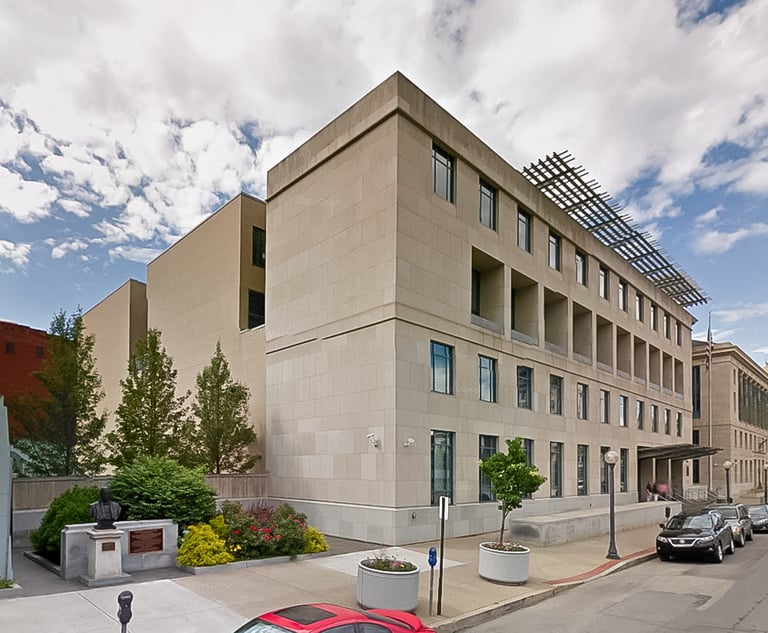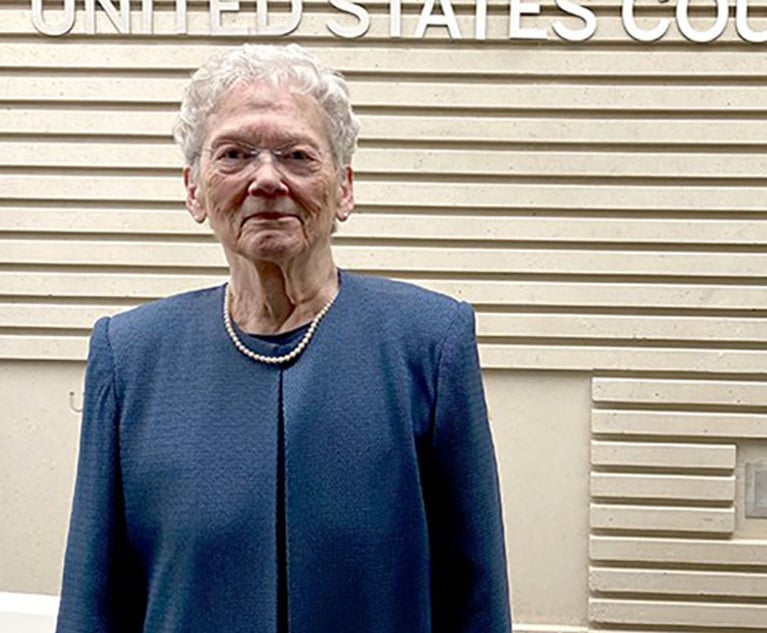 University of Pennsylvania crest. Photo credit: Photo: Bryan Y.W. Shin, via Wikimedia Commons
University of Pennsylvania crest. Photo credit: Photo: Bryan Y.W. Shin, via Wikimedia CommonsEx-Campus Cop's Discrimination Suit Over Razor Bumps Proceeds Against UPenn
A former University of Pennsylvania police officer who claimed he was discriminated against for avoiding shaving because of a skin condition common among black men can move forward with his discrimination lawsuit against the university.
January 29, 2018 at 04:06 PM
3 minute read
A former University of Pennsylvania police officer who claimed he was discriminated against for avoiding shaving because of a skin condition common among black men can move forward with his discrimination lawsuit against the university.
U.S. District Judge Gene E.K. Pratter of the Eastern District of Pennsylvania allowed half of plaintiff Joseph Lewis Jr.'s claims to move forward while granting summary judgment on the rest in favor of Penn. The surviving claims include Title VII disparate treatment, Americans with Disabilities Act discrimination and retaliation, hostile work environment and related claims under the Pennsylvania Human Relations Act and the Pennsylvania Fair Practices Ordinance.
The university's police department requires officers to be clean-shaven, but Lewis claimed shaving irritated his face due to pseudofolliculitis barbae, commonly known as razor bumps. Lewis claimed he was subjected to discriminatory treatment by supervisors and colleagues, who mocked him for not adhering to the department's grooming policy.
Lewis claimed he was taken off his normal beat and denied vacation time. Additionally, he alleged he was retaliated against for requesting a disability accommodation to not shave. Ultimately, he was placed on paid leave.
In her opinion, Pratter said that when looked at as a whole, Lewis' allegations could overcome summary judgment.
“Most of these actions fall into the category of petty slights or minor annoyances and do not qualify as adverse employment actions on their own,” Pratter said of Lewis' ADA claims. “However, for the same reasons as in the discrimination claim, the court finds that a reasonable jury could conclude that Mr. Lewis suffered an adverse employment action when all of the actions are viewed together.”
That was especially so when considering his reassignment, Pratter said.
The department claimed “they were simply moving him to a 'regular beat and schedule that matched most of the other UPPD officers,' which was entirely within their discretion,” Pratter said. “However, courts have found that reassignment can be materially adverse and support a retaliation claim even when there is no reduction in pay.”
Lewis' Title VII disparate impact claim was tossed because he failed to show how the grooming policy acutely affected black officers, according to Pratter.
“While Mr. Lewis claims that three African-American men were burdened by Directive 45 [the grooming standard] and that the reason they were burdened by the policy was a skin condition that predominately affects African-American men, he has not carried his burden in proving that this policy had a disparate impact based on race,” Pratter said.
However, Lewis' disparate treatment claim was allowed to move forward because the department did not directly challenge it.
Lewis' attorney, Timothy Creech of Creech & Creech, called the lawsuit “an egregious case of discrimination.”
Penn is represented by Joe Tucker of the Tucker Law Group,
“We are pleased with Judge Pratter's well-reasoned opinion wherein she dismissed Plaintiff's wrongful discharge claim. We look forward to trial where we will demonstrate that Plaintiff's other claims are equally without merit,” Tucker said.
This content has been archived. It is available through our partners, LexisNexis® and Bloomberg Law.
To view this content, please continue to their sites.
Not a Lexis Subscriber?
Subscribe Now
Not a Bloomberg Law Subscriber?
Subscribe Now
NOT FOR REPRINT
© 2024 ALM Global, LLC, All Rights Reserved. Request academic re-use from www.copyright.com. All other uses, submit a request to [email protected]. For more information visit Asset & Logo Licensing.
You Might Like
View All

Middle District of Pennsylvania's U.S. Attorney Announces Resignation
2 minute read

Trending Stories
- 1Zuckerman Spaeder Gets Ready to Move Offices in DC, Deploy AI Tools in 2025
- 2Pardoning Jan. 6 Defendants May Send Bad Message About Insurrection, Rule of Law
- 3Looming Clash Over Abortion Pills Shows Overturning 'Roe v. Wade' Settled Nothing
- 43rd Circuit Strikes Down NLRB’s Monetary Remedies for Fired Starbucks Workers
- 5Latest Class of Court Officers Sworn into Service in New York
Who Got The Work
Michael G. Bongiorno, Andrew Scott Dulberg and Elizabeth E. Driscoll from Wilmer Cutler Pickering Hale and Dorr have stepped in to represent Symbotic Inc., an A.I.-enabled technology platform that focuses on increasing supply chain efficiency, and other defendants in a pending shareholder derivative lawsuit. The case, filed Oct. 2 in Massachusetts District Court by the Brown Law Firm on behalf of Stephen Austen, accuses certain officers and directors of misleading investors in regard to Symbotic's potential for margin growth by failing to disclose that the company was not equipped to timely deploy its systems or manage expenses through project delays. The case, assigned to U.S. District Judge Nathaniel M. Gorton, is 1:24-cv-12522, Austen v. Cohen et al.
Who Got The Work
Edmund Polubinski and Marie Killmond of Davis Polk & Wardwell have entered appearances for data platform software development company MongoDB and other defendants in a pending shareholder derivative lawsuit. The action, filed Oct. 7 in New York Southern District Court by the Brown Law Firm, accuses the company's directors and/or officers of falsely expressing confidence in the company’s restructuring of its sales incentive plan and downplaying the severity of decreases in its upfront commitments. The case is 1:24-cv-07594, Roy v. Ittycheria et al.
Who Got The Work
Amy O. Bruchs and Kurt F. Ellison of Michael Best & Friedrich have entered appearances for Epic Systems Corp. in a pending employment discrimination lawsuit. The suit was filed Sept. 7 in Wisconsin Western District Court by Levine Eisberner LLC and Siri & Glimstad on behalf of a project manager who claims that he was wrongfully terminated after applying for a religious exemption to the defendant's COVID-19 vaccine mandate. The case, assigned to U.S. Magistrate Judge Anita Marie Boor, is 3:24-cv-00630, Secker, Nathan v. Epic Systems Corporation.
Who Got The Work
David X. Sullivan, Thomas J. Finn and Gregory A. Hall from McCarter & English have entered appearances for Sunrun Installation Services in a pending civil rights lawsuit. The complaint was filed Sept. 4 in Connecticut District Court by attorney Robert M. Berke on behalf of former employee George Edward Steins, who was arrested and charged with employing an unregistered home improvement salesperson. The complaint alleges that had Sunrun informed the Connecticut Department of Consumer Protection that the plaintiff's employment had ended in 2017 and that he no longer held Sunrun's home improvement contractor license, he would not have been hit with charges, which were dismissed in May 2024. The case, assigned to U.S. District Judge Jeffrey A. Meyer, is 3:24-cv-01423, Steins v. Sunrun, Inc. et al.
Who Got The Work
Greenberg Traurig shareholder Joshua L. Raskin has entered an appearance for boohoo.com UK Ltd. in a pending patent infringement lawsuit. The suit, filed Sept. 3 in Texas Eastern District Court by Rozier Hardt McDonough on behalf of Alto Dynamics, asserts five patents related to an online shopping platform. The case, assigned to U.S. District Judge Rodney Gilstrap, is 2:24-cv-00719, Alto Dynamics, LLC v. boohoo.com UK Limited.
Featured Firms
Law Offices of Gary Martin Hays & Associates, P.C.
(470) 294-1674
Law Offices of Mark E. Salomone
(857) 444-6468
Smith & Hassler
(713) 739-1250





